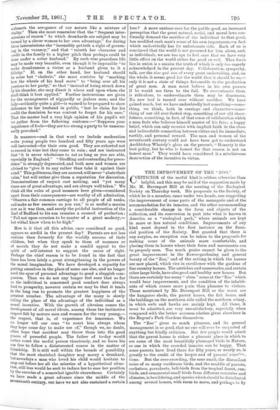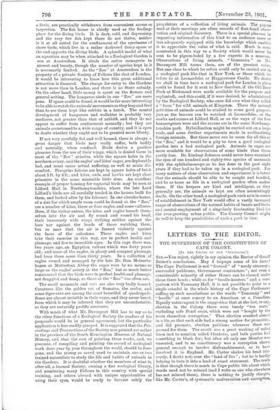THE IMPROVEMENT OF THE "ZOO."
CRITICISM of the useful kind is seldom otherwise than helpful, and this may be said of the suggestion made by Mr. M. Davenport Hill at the meeting of the Zoological Society on Thursday week. His proposals to the Society, of which he is a member, came under two heads, one suggesting the improvement of some parts of the menagerie and of the accommodation for its inmates, and the other recommending a considerable change in the form and objects of the collection, and its conversion in part into what is known in America as a "zoological park," where animals are kept in more or less natural conditions. Improvements of any kind must depend in the first instance on the finan- cial position of the Society. But granted that there is any surplus, no exception can be taken to the proposals for making some of the animals more comfortable, and placing them in houses where their form and movements can be properly seen. Too much praise cannot be given to the great improvement in the flower-gardening and general beauty of the "Zoo," and of the setting in which the houses are now placed, which vies in excellence with the gardens of fine country houses. The ostriches and cassowaries, and certain other large birds, have also good and healthy new houses. But there are certainly too many" slum " areas at the "Zoo "which would bear improvement, and the condition of the inhabit- ants of which causes more p am n than pleasure to visitors. Those mentioned by Mr. Davenport Hill as the worst are the kangaroo sheds, the parrot house, the fish house, and the buildings on the north ern side called the northern aviary, in which owls and hawks are mainly kept. All these, it must be admitted, are very unsatisfactory, especially when compared with the better accomm odation given elsewhere in the Regent's Park Gardens themselves.
The " Zoo " gives so much pleasure, and its general management is so good, that no one will ever be suspected of anything but kindly criticism. But few people would admit that the parrot house is either a pleasant place in which to see some of the most beautifully plumaged birds in Nature, or one in which the crowded inmates can be happy. That some parrots have lived there for fifty years, or nearly so, is greatly to the credit of the keeper and of parrots conga', , tions. But the over-crowding, the sour smell, the discordant noise of so many vociferous birds, and the muddle of parrots, cockatoos, parrakeets, bell-birds from the tropical forest, sun. birds, and ornamental small birds from different countries and climates, is bewildering, and species which should be distributed among several houses, with room to move, and perhaps to fly
a little, are practically withdrawn from convenient access or inspection. The fish house is chiefly used as the feeding- place for the diving birds. It is dark, cold, and depressing, and the very few fish kept there do not thrive, neither is it at all suited for the confinement of the specimens of shore birds, which live in a rather darkened damp space at the end opposite the diving birds. A splendid model of what an aquarium may be when attached to a Zoological Garden is een at Amsterdam. It rivals the entire menagerie in nterest and beauty, though the number of species kept in it is necessarily limited. As the " Zoo " at Amsterdam is the property of a private Society of Fellows like that of London, it would be interesting to know how this great additional attraction is financed. The charge for entry to the Gardens is not more than in London, and there is no State subsidy. On the other hand, little money is spent on the flowers and general setting. The kangaroo sheds in our "Zoo" are mere pens. If space could be found, it would be far more interesting to be able to watch the animals' movements as they leap:and feed than to see them kept like rabbits in a hutch. The mental development of kangaroos and wallabies is probably very mediocre, not greater than that of rabbit, and they do not appear to suffer from confinement mentally ; but they are animals accustomed to a wide range of country, and it is open to doubt whether they ought not to be granted more liberty.
If not very carefully fed and well housed, there is always a great danger that birds may really suffer, both bodily and mentally, when confined. Birds derive a positive pleasure from the use of their wings, which is denied them in most of the "Zoo" aviaries, while the square holes in the northern aviary, and the eagles' and kites' cages, are deplorably bad, and must cause actual suffering, as well as acute dis- comfort. Peregrine falcons are kept in square holes of brick about 5 ft. by 4 ft., and kites, owls, and hawks are kept close prisoners in the same miserable little dens. An excellent example of proper housing for raptorial birds may be seen at Lilford Hall in Northamptonshire, where the late Lord Lilford's birds are all carefully tended in the houses built for them, and looked after by his falconer. In one circular house, of a size for which ample room could be found at the "Zoo," are a number of kites, three or four eagles, and some vultures. Here, if the visitor enters, the kites and eagles launch them- - selves into the air and fly round and round his head, their immensely wide wings striking neither against the bars nor against the heads of those watching them, but so near that the air is fanned violently against the faces of the' onlookers. These eagles and kites take their exercise in this way, are in perfect health and plumage, and live to incredible ages. In this cage there was, two years ago, an Egyptian vulture which was forty years old ; and some of the eagles, in glossy and compact plumage, bad been there more than thirty years. In a collection of eagles owned and managed by the late Mr. Dan Meinertz- hagen at Mottesfont Abbey the cages were by no means so large as the eagles' aviary at the "Zoo," but so much better constructed that the birds were in perfect health and plumage, not draggled and damp, as those at the "Zoo" too often are.
The small mammals and eats are also very badly housed. Creatures like the golden cat of Sumatra, the ocelot, and some tiger-cats are among the most beautiful of quadrupeds. Some are almost invisible in their cages, and they never breed, from which it may be inferred that they are uncomfortable, as they are naturally prolific creatures.
With much of what Mr. Davenport Hill has to say as to the other functions of a Zoological Society the readers of his proposals would be in ' general agreement, but the particular application is less readily grasped. It is suggested that the Pro- ceedings and Transactions of the Society now printed are rather in the province of the South Kensington Museum of Natural History, and that the cost of printing these works, and, we presume, of compiling and printing the record of zoological work done year by year throughout the world, should be fore- gone, and the money so saved used to maintain one or two trained naturalists to study the life and habits of animals in the Gardens. It is doubtful whether the members of what is, after all, a learned Society; owning a fine zoological• library, and numbering many Fellows in this country with special training, and others 'abroad with unique opportunities of using their eyes, would be ready to become solely the
proprietors of a collection of living animals. The paperi
• read at their meetings are often records of first-hand- obser-- ration and original discovery. There is a special pleasure in imparting information of this kind to an audience more or less adequately equipped with the knowledge which enables it to appreciate the value of what is said. Much is corn- municated in this way to a Society which would never be sent to be pigeon-holed by a few experts in a museuxn. Observations of living animals, " bionomics " asTilr. Davenport Hill terms them, are of the greatest value. But one class to which he refers could only be carried out in a zoological park like that in New York, or those which be refers to at Leonardslee or Haggerstone Castle. No doubt we shall in time have a zoological park for London (a place could be found for it next to Kew Gardens, if the Old Deer Park at Richmond were made available for the purpose and replanted), and this could, if it were desired, be administered by the Zoological Society, who once did own what they called a "farm "for wild animals at Kingston. There the natural activities of animals could be studied to some good purpose, just as the beavers can be watched at Leonardslee, or the storks and cranes at Lilford Hall, or as the ways of the free lammergeiers were and the ravens are in the same Northamp- tonshire park. Hybridisation might be carried out on a large scale, and some further experiments made in acclimatising foreign animals. 'But there never can be room for all this at the "Zoo," and it would be a pity to turn a good zoological garden into a bad zoological park. Animals in cages are more available for observations of some kinds than those partly free. Dr. Lindsay Johnson could never have examined the eyes of one hundred and eighty-two species of mammals with the ophthalmoscope as he has done in the past eight years if they had to be 'taken up in a zoological park. For many matters of close observation and experiment it is better that the animals should be able to be caught and handled, and be as tame as life in a zoological garden often makes them. If the keepers are kind and intelligent, as they generally are, the animals so kept are often astonishingly docile. On the other hand, a zoological park such as is in course of establishment in New York would offer a vastly increased range of observations of the natural habits of beasts and birds, and mental employment of a singularly fascinating kind for the ever-growing urban public. The County Council might do well to keep the possibilities of such a park in view.











































 Previous page
Previous page